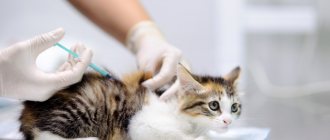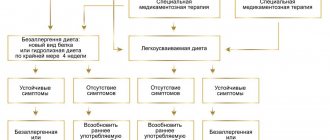Vaccination is one of the most important procedures for caring for domestic cats. This preventive measure helps prevent the development of the most dangerous feline diseases, leading to severe health consequences and premature death. Vaccinations for cats are done in veterinary clinics according to the vaccination calendar. The owner needs to properly prepare the animal for the procedure and follow all the doctor’s recommendations regarding caring for the cat after vaccination.
In the article we will look at why cats need vaccinations, how to prepare the animal for the procedure, recommendations for vaccinating cats depending on age, and types of medications.
Why is cat vaccination necessary?
Vaccination of cats is an effective measure to prevent a number of diseases, aimed at stimulating the production of antibodies that destroy active viruses that enter the animal’s body in case of infection. Simply put, vaccinations develop immune protection against various infections that provoke the development of deadly diseases.
In veterinary clinics, domestic cats are vaccinated at the request of the owner himself, who wants to protect his pet from the risks of contracting infections.
Vaccinations are recommended for all domestic cats without exception, even those who do not go outside at all. Viruses can spread through food and water. Even the most caring owner can become the culprit of a cat infection, bringing a dangerous infection into the house on clothes or the soles of shoes.
What is a vaccination (vaccine)
This is an injection that is:
- Serum obtained from the blood of animals that have immunity.
- A vaccine containing neutralized (weakened) live pathogens of an infectious disease that stimulate the body to actively develop immunity.
High-quality drugs from reputable manufacturers are manufactured in strict accordance with established standards. They must be stored and transported in a strictly defined manner. All these precautions can only be observed by specialists. Such drugs do not harm the animal and provide reliable protection against pathogenic agents.
What diseases are vaccinated against?
According to the vaccination calendar, cats are recommended to be vaccinated according to age against several of the most dangerous diseases.
What diseases is it recommended to vaccinate your cat against?
- Rabies (rabies) is a deadly infectious disease that cannot be cured. Manifests itself with severe symptoms that occur 2-3 days after infection. Infected animals and rodents are carriers of the infection.
- Rhinotracheitis is a herpesvirus infectious disease that affects the respiratory and visual organs. Has an acute course. The carriers of the virus are sick cats. Mortality occurs in 20% of cases.
- Calcivirosis is a common infectious disease of cats, transmitted from other members of the genus who are carriers of the insidious virus. The risk of death is more than 80%.
- Viral peritonitis is an infectious disease caused by coronavirus. Infection occurs through airborne droplets after contact with a carrier of the infection. The risk of death is very high (more than 90% of cats die).
- Panleukopenia is an acute viral disease also known as feline distemper. Sick or already ill cats serve as spreaders of infection. Difficult to treat. Causes critical symptoms. The risk of death is 90%.
- Chlamydia is a contagious feline disease of an infectious nature with a severe and long-term course. The main carriers of infection are birds and rodents. The disease affects the genitourinary, respiratory, visual and digestive systems. There are risks of infecting people.
- Microsporia is a skin disease also known as ringworm. Carriers of infection are sick animals. A cat with microsporia often infects its owner. The most popular drugs for vaccinating cats against various infections: Nobivak, Quadrikat, Multifel-4, Microderm, Leukotsel, Felovax-4, etc. The drug will be selected by the attending veterinarian.
Vet clinic
Our specialty is reflected in our name – a good veterinarian.
A large number of clinics allow us to provide assistance to animals without wasting time and money on travel - this allows us to declare that we are always nearby, and we are ready to take responsibility for the life of your four-legged friend.
The veterinary clinic is an ambulance for your pet!
A veterinary clinic with experienced doctors provides emergency care for sick animals. It often happens that for a whole day a cat or dog felt great, played happily - and suddenly their condition worsened sharply. What to do in this case? There is a solution: this is a 24-hour veterinary clinic. You can bring your pet here at any time - day or night.
24-hour veterinary clinic: doctors will see you immediately!
It is extremely convenient for animal owners that the veterinary clinic is open throughout the day. Routine vaccinations can be done during the day. Emergency admissions to four-legged patients are provided as needed.
This type of service is convenient and beneficial for animal owners who are busy with service matters during working hours. They experience difficulties of various kinds: they do not have time to vaccinate, cut the dog’s hair, trim the cat’s claws, or sterilize. A veterinary clinic that serves clients 24 hours a day without a break allows you to solve the listed problems freely, without much stress. There is no need to take time off from work when you need to carry out an important pet care procedure.
Consulting services
Information about the rules for keeping cats, dogs, rabbits, guinea pigs, and hamsters is easy to obtain from various sources. It is advisable to first contact specialists with appropriate education. The clinic is staffed with highly qualified personnel: surgeons, anesthesiologists, and surgical assistants. Years of study at a higher educational institution have given them the knowledge that helps them quickly and efficiently carry out diagnostics, identifying the cause of a furry client’s illness. The result of this is to determine the correct treatment paths.
An important factor in ensuring good health is timely informing owners about all the dangers that may await their little friends. The veterinary clinic plays an important role in this matter: its employees are required to advise clients on the prevention of infectious diseases, the fight against worms, and the need for vaccination. Owners who love their “little brothers” have a lot of questions. Representatives of the medical staff of the Good Veterinarian clinic are ready to answer them.
The veterinary clinic is equipped with modern equipment
There is no doubt that a veterinary clinic equipped with the latest medical technology will be able to provide the best care to its clients. The in-depth knowledge of the medical staff may not be enough if the hospital does not have medicines or modern equipment for examinations and surgical operations.
Animals and people equally need quality care, and “The Good Veterinarian” meets the expectations of city residents, fully satisfying their needs.
The 24-hour veterinary clinic performs planned and urgent surgeries. Emergency care is a guarantee of survival for a dumb patient who urgently needs medical examination and care.
Come to the address indicated on the website. Kind, sympathetic, professional veterinarians will provide a warm welcome, help determine the cause of the animal’s illness, and carry out the necessary procedures and manipulations. We assure you: your pet will again be a cheerful, carefree, joyful creature, bringing moments of happiness to family members.
veterinary hospital
Vaccination calendar for cats
Cats are vaccinated according to the preventive vaccination schedule according to age. Based on individual indications, the veterinarian can adjust the timing of immunization.
Vaccination schedule for cats:
- Panleukopenia, calcivirosis, chlamydia and rhinotracheitis - vaccination at 8 weeks, revaccination at 10-12 weeks and then after 12 months every year.
- Rabies - first vaccination at 12 weeks, revaccination annually.
- Microsporia - vaccination at 8 weeks, revaccination after 2 weeks and then every year.
- Viral peritonitis - first vaccination at 16 weeks, again after 4 weeks. Revaccination annually.
The cost of vaccination includes:
- full clinical examination and consultation of the patient,
- certified vaccine,
- administration of the vaccine and documentation of vaccination
Vaccination of cats and kittens.
Why should you vaccinate your cat? What vaccinations are there for kittens? At what age should a kitten be vaccinated (vaccination calendar). Should my cat be vaccinated against rabies? What is included in complex vaccines for cats. Is it safe to vaccinate cats? What to do if your cat is overdue for vaccinations. These and many other questions worry the owners of our four-legged patients. Let's find out!











